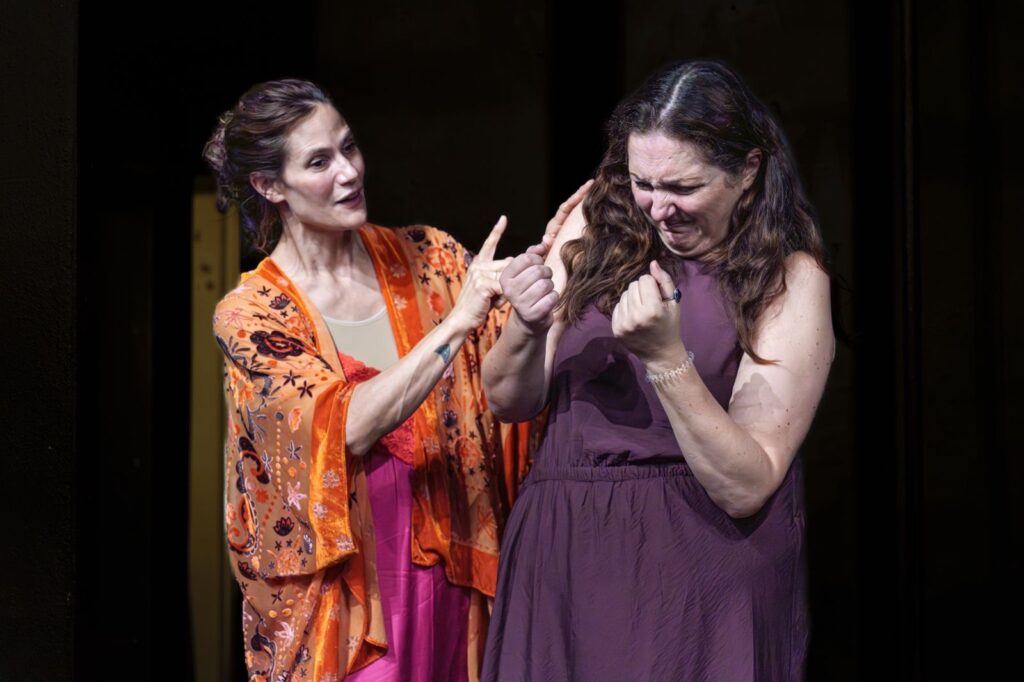
In the new play Waving, premiering this week at Etcetera Theatre, ‘three characters wave from different shores as time and reality mix in the mess pallet of life, loss, and identity’. Fringe Review spoke with playwright Rosalind Philp and performer Ava de Winter about self-production, the need for mature female roles, and what we leave behind.
Erin Murray Quinlan, Fringe Review: Tell me a little bit about Waving.
Rosalind Philp, playwright: It’s about an artist and her family. She’s not quite as she seems; she’s got dementia. She’s a disruptive personality anyway, but it’s this added thing that’s going on in the family, and they’re trying to cope and trying to make the best of this ongoing situation whilst losing her. [The play is] about memory, it’s about what is left behind as an artist, and as a mother.
EMQ: What is the significance of the title?
RP: I’m from Hastings, so I wanted the ambience of the seaside town. Then there’s the idea of waving to a person, if they see you or not, that idea of communicating to another person, and how they view you from the other side. There’s also the [Stevie Smith] poem, ‘Not Waving but Drowning’, pretending you’re fine, but actually you’re going under and saying goodbye.
Ava de Winter, performer: Saying goodby and saying hello, it always happens across a void. There’s this distance.
EMQ: Ros, this is your first play, and it’s based on Ava’s experiences with her mother, as well as some of your own. How did that come together?
RP: We met at an agency, and I was Ava’s mentor, and we just got chatting, and I said, “Oh, you must do a one woman play about your life.” So we got together, and we hashed out ideas, basically just over coffees at the National Theater, trying to kind of imbue and take on board the artistic environment. I and came up with the overall idea, and then I went away and wrote it. But I wouldn’t have written it had it not been for our conversations about finding this common ground, and I’m afraid, pulling from Ava’s life. I did check with you, like, is that okay? Is it okay? Is it okay? Because, you know, it’s very personal. The character [of the Artist] is neither of our mothers specifically. She’s got bits of of them, I guess both, both of them in her she’s her own sort of fictitious character. And to go into that character, it’s quite draining, isn’t it?
AdW: It’s very tiring. Alzheimer’s is a huge thing for me. It’s where I want to focus a lot of my work. Going forward, as an actress and a maker of work there are certain things you leave behind, and what happens to that when you have Alzheimer’s? You can’t speak for yourself. And so then all you are is what people remember and how they remember it, or what they decide that you are. Is it an amalgamation of moments that create a feeling, an emotion, that you then carry through. How are those memories built if you don’t have a written record of what they did? And how do you separate something from inherently in being an artist, there’s a bit of selfishness there. You’re doing your art. Yes, you’re also a mother, but also you want something for yourself that’s not being a mother, and it’s a touchstone for me and for Ros as it’s exactly that we are doing it now. And what Ros did extremely well in this play is allow a window into this person and a window into memory that lets you decide for yourself, but also shows the differences in in what we remember versus the lived experience, and how each person’s experience of a person is different. As we get older, there aren’t a lot of parts for women our age, and we have stories to tell. We’ll tell our own. We’ll write our own. We’ll make our own. And because women in their 50s are important, we have a lot to say. We don’t have youth and beauty, but boy, do we have a lot to say about a lot of things.
EMQ: You both have experience in different mediums. Why is theatre the way you want this story to be told?
RP: It was possible, and it’s quicker process, and we wanted to get it out there. We both sort of both feel like the time’s now. If it were another form, it would just take too long to get out there. And [with theatre], you have a bit more control over the finished product as well, so that’s quite appealing.
AdW: I had spent 30 years really doing two dimensional things. I’m also a writer. I write a lot of poetry and vignettes, short stories, essays, observations, Op Ed. And so after all this time of two dimensional stuff, I came back to acting because I’ve spent a lot of time alone by myself, with these stories, observing and collecting and amassing. And now it’s time for me to do that in three dimensions.
RP: And she also paints. She paints on the stage during the play, and we had it in rehearsal the other day, and she was painting the sitter, and my character comes around to have a look. And it’s kind of like, fuck, really bloody good! So I didn’t have to act.
AdW: There’s something about the immediacy of theater that, especially for this theme, is extremely important. It’s going to be different every night, everyone’s experience it of it is going to be different, just like life, just like memory. It’s not a painting that’s going to hang on the wall. It’s not a film in a can. It’s none of those things. It’s different every single time. And everyone that comes to this, if you didn’t see it, you’re not just not going to see it.
Waving is playing at the Etcetera Theatre on the 25th and 26th September at 13:00 and 28th September at 20:00.
This article has been edited for clarity and space.
Erin Murray Quinlan is a playwright and dramaturg in London.




























